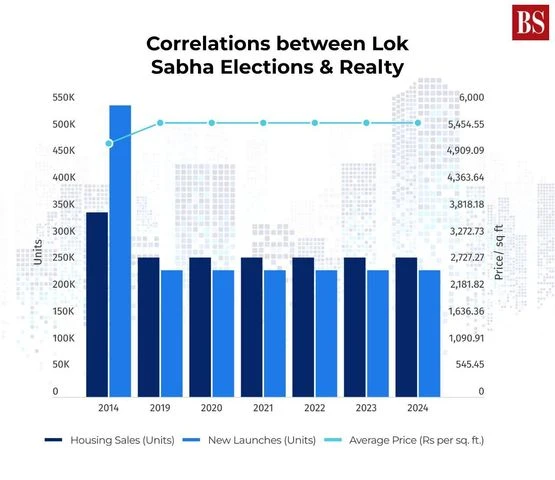Decisive election result in 2014 and 2019 boosted homebuyer sentiment. Photo: Shutterstock
There is a striking correlation between Lok Sabha elections and India’s residential real estate market, according to an analysis by ANAROCK Group. Data from the past two elections (2014 and 2019) shows a surge in residential real estate activity.
A surge in activity
In 2014, the top seven cities in India witnessed the sale of approximately 345,000 housing units. This period also saw the highest-ever number of new property launches, nearing 545,000 units. A similar upswing was observed in 2019, with around 261,000 units sold and approximately 237,000 new launches recorded, following a period of stagnation between 2016 and 2018.
Market reforms and revival
The intervening years between 2016 and 2019 were marked by significant reforms, including Demonetisation (DeMo), the Real Estate (Regulation and Development) Act (RERA), and the Goods and Services Tax (GST). These reforms transitioned the Indian real estate sector from a largely unregulated domain to a more structured and transparent market. The post-reform era saw a decline in less reputable developers, making way for more organised entities and restoring buyer confidence.
Decisive election result in 2014 and 2019 boosted homebuyer sentiment: Experts believe that the decisive results of the elections in these years boosted homebuyer confidence, leading to a rise in activity.
)
Price trends and future projections
Data analysis reveals that 2014 outperformed 2019 in terms of price growth. Average prices in the top seven cities increased by over 6% in 2014, compared to a modest 1% rise in 2019. Despite a slowdown between 2016 to 2019, largely due to regulatory changes and financial sector disruptions, the market began to recover post-2019, with the pandemic in 2020 briefly halting the momentum before a strong resurgence in 2021.
Impact of policy reforms
The introduction of major reforms like Demonetization (Demonetisation), RERA (Real Estate Regulation and Development Act), and GST (Goods and Services Tax) in 2016-2017 played a significant role. These reforms brought much-needed structure and regulation to the real estate sector, which was earlier considered Wild West-like. Many unreliable developers exited the market, making way for stronger, organized players. This instilled trust back in homebuyers.
Market predictions for 2024
Anuj Puri, Chairman of ANAROCK Group, believes that with all the key real estate regulations in place, strong GDP growth predictions, controlled inflation, and high homebuyer optimism, 2024 could see another peak in housing sales and new launches.
Visit www.cagurujiclasses.com for practical courses











